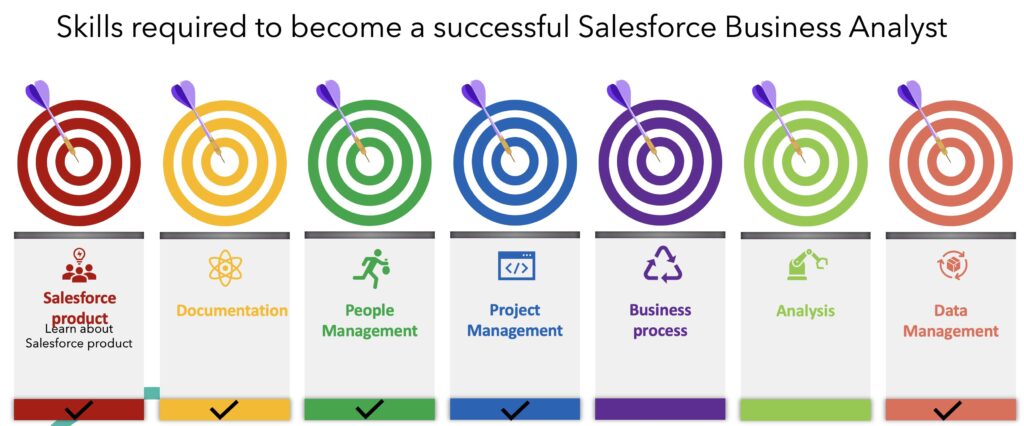Introduction – Business Analyst Roles and Responsibilities
In the dynamic landscape of modern business, the Business Analyst Roles stands as a linchpin for organizational success. A Business Analyst serves as a bridge between the business stakeholders and the technology solutions, translating complex business requirements into tangible and effective solutions. With a keen understanding of both business processes and technological advancements, BAs play a pivotal role in identifying opportunities for improvement, streamlining operations, and fostering innovation within an organization.
Business analyst (BA)helps guide businesses in improving processes, products, services, and software through data analysis. These agile workers straddle the line between IT and the business to help bridge the gap and improve efficiency In modern business, organizations seek effective ways to navigate challenges, capitalize on opportunities, and optimize their operations. The role of Business Analyst (BA) has emerged as a crucial link between business objectives and technological solutions. This article explores the key responsibilities, skills, and impact of business analysts in today’s corporate environment.
The primary responsibility of a Business Analyst involves conducting thorough analyses of business processes, systems, and data to identify areas for enhancement. They collaborate closely with stakeholders to gather and document requirements, ensuring a comprehensive understanding of business needs. Moreover, BAs play a crucial role in facilitating communication between various departments, acting as catalysts for change by proposing and implementing strategic solutions. Ultimately, The Business Analyst Roles is indispensable in driving efficiency, informed decision-making, and the overall success of a business in today’s ever-evolving market.
Defining the Business Analyst Roles
1. Definition and Purpose
A Business Analyst is a professional who acts as a bridge between business stakeholders and IT teams. Their primary goal is to understand the business needs, identify opportunities for improvement, and translate these into actionable recommendations.
2. Key Responsibilities
Business analysts are tasked with gathering, analysing, and documenting business requirements. They play a pivotal role in facilitating communication between various stakeholders, ensuring that the final solution aligns with organizational goals.
What is secured personal loan?- Process, Features and Eligibility

The Skills of a Business Analyst
1. Analytical Skills
Analytical prowess is at the core of a business analyst’s skill set. They must be adept at evaluating data, identifying trends, and drawing meaningful insights to inform decision-making processes.
2. Communication Skills
Effective communication is paramount for a business analyst. They must convey complex technical concepts to non-technical stakeholders and vice versa, fostering collaboration across departments.
3. Technical Proficiency
While not necessarily IT experts, business analysts need a solid understanding of technology. This enables them to engage with IT teams, comprehend system architectures, and ensure that proposed solutions align with technical feasibility.
4. Problem-Solving Abilities
Business analysts are problem solvers by nature. They must approach challenges with a strategic mind-set, devising innovative solutions to address both immediate issues and long-term goals.
The Business Analyst Lifecycle
1. Planning and Scoping
At the outset of a project, business analysts collaborate with stakeholders to define project scope, objectives, and deliverables. This phase sets the foundation for the entire project lifecycle.
2. Requirement Gathering and Analysis
One of the primary responsibilities of a business analyst is to collect and analyze business requirements. This involves conducting interviews, workshops, and surveys to gain a comprehensive understanding of stakeholder needs.
3. Design and Documentation
Once requirements are identified, business analysts collaborate with designers and developers to create a detailed solution design. Documentation, such as use cases and process flows, is crucial to ensure a clear roadmap for implementation.
4. Implementation and Testing Support
Business analysts play a key role during the implementation phase, providing support to developers and QA teams. They ensure that the final product aligns with the initially defined requirements.
5. Monitoring and Continuous Improvement
Even after project implementation, business analysts remain involved in monitoring the solution’s performance. They collect feedback, analyze data, and identify opportunities for continuous improvement.

Business Analyst Salary
Navigating Compensation in the Corporate Landscape
Business analysts play a crucial role in shaping an organization’s success, and their compensation reflects their value in the corporate landscape. This article explores the factors influencing business analyst salaries, providing insights into the remuneration patterns and the variables that impact their earnings.
Factors those are Affecting Business Analyst Salaries
1. Experience and Expertise
Unsurprisingly, experience is a significant determinant of a business analyst’s salary. Those with a proven track record and specialized expertise command higher compensation, as their skills contribute to more effective problem-solving and decision-making.
2. Geographic Location
Salaries for business analysts vary based on geographic location. Positions in metropolitan areas or regions with a high cost of living generally offer higher compensation to offset expenses.
3. Industry Sector
The industry in which a business analyst operates can significantly influence salary levels. For instance, business analysts in the finance or technology sectors may earn higher salaries compared to those in non-profit organizations.
4. Educational Background
A business analyst’s educational qualifications, such as holding an advanced degree or relevant certifications, can positively impact salary negotiations. Continuous learning and professional development contribute to their market value.
Business Analyst Job Description
Understanding the business analyst roles is essential for both aspiring professionals and organizations seeking to leverage their expertise. This article delves into the comprehensive job description of a business analyst, outlining the key responsibilities that define their contributions to organizational success.
What is Income Tax? Latest News, Slab, Penalties, IT Act & Return and Advance Tax 2023

Core Responsibilities of a Business Analyst
1. Requirement Analysis:
Business analysts are tasked with gathering, documenting, and analyzing business requirements to facilitate effective decision-making and solution design.
2. Stakeholder Communication:
Effective communication with stakeholders is crucial. Business analysts act as intermediaries, ensuring that business needs are clearly conveyed to development teams and vice versa.
3. Process Improvement:
Identifying inefficiencies in business processes and recommending improvements to enhance operational efficiency.
4. Data Analysis:
Utilizing analytical skills to interpret data, identify trends, and provide valuable insights for informed decision-making.
5. Solution Design:
Collaborating with design and development teams to create detailed solution designs that align with business requirements.
Home Equity Loans – it’s Types, Work and Benefits
Business Analyst Roles and Responsibilities
The dynamic business analyst rolesencompasses various responsibilities that contribute to an organization’s success. This article provides a detailed exploration of the roles and responsibilities that define the landscape of a business analyst’s contribution to organizational growth.
1. Strategic Planning:
Collaborating with stakeholders to align business objectives with strategic plans and technological solutions.
2. Risk Assessment:
Identifying potential risks and proposing mitigation strategies to ensure project success.
3. Continuous Improvement:
Actively seeking opportunities to enhance processes, systems, and workflows for increased efficiency.
4. Project Management Support:
Assisting in project management by providing valuable insights, managing requirements, and ensuring deliverables align with business goals.
5. Training and Support:
Providing training and support to end-users during the implementation of new systems or processes.
In summary, business analyst roles and responsibilities are diverse and pivotal in driving organizational success. By understanding these key aspects, both professionals and organizations can navigate the landscape of business analysis more effectively.
Impact of Business Analysts on Business Success
1. Enhancing Decision-Making
By providing valuable insights into business processes and market trends, business analysts empower decision-makers to make informed choices that drive organizational success.
2. Improving Operational Efficiency
Through the identification of inefficiencies and bottlenecks, business analysts contribute to streamlining operations, reducing costs, and improving overall efficiency.
3. Facilitating Innovation
Business analysts play a pivotal role in fostering innovation by identifying opportunities for process improvement and recommending cutting-edge solutions.
Challenges Faced in Business Analyst Roles
1. Ambiguity in Requirements
Navigating through vague or constantly changing requirements poses a significant challenge for business analysts. Clear communication and documentation are crucial in mitigating this issue.
2. Resistance to Change
Implementing new systems or processes may face resistance from employees accustomed to existing workflows. Business analysts must effectively communicate the benefits of change to overcome such resistance.
Business Analyst Interview Questions
Conducting a successful business analyst interview requires asking insightful questions that assess not only technical knowledge but also the candidate’s analytical and problem-solving skills. This article presents a compilation of interview questions designed to evaluate a candidate’s suitability for the business analyst roles.
Sample Interview Questions
- Can you describe a situation where you successfully bridged the communication gap between business stakeholders and technical teams?
- How do you prioritize conflicting requirements in a project with limited resources?
- Give an example of a challenging project you’ve worked on. What obstacles did you face, and how did you overcome them?
- Explain the importance of SWOT analysis in the context of business analysis.
- How do you stay updated on industry trends and technological advancements relevant to you in a business analyst roles?
What is secured personal loan?- Process, Features and Eligibility

Conclusion
The impact of a skilled business analyst reverberates across various facets of an organization. By identifying opportunities for improvement, streamlining workflows, and implementing data-driven solutions, they contribute significantly to operational excellence. Moreover, in an era where data reigns supreme, business analyst roles play a pivotal role in harnessing the power of information to inform strategic decision-making.
Business Analyst Roles is multifaceted and pivotal in driving business success. From defining project scope to facilitating innovation, business analysts contribute significantly to organizational growth. By possessing a unique blend of analytical, communication, and technical skills, these professionals bridge the gap between business needs and technological solutions, ensuring a harmonious alignment between strategy and execution.
The business analyst roles is paramount in navigating the complex landscape of modern business. As organizations strive for efficiency, innovation, and strategic growth, business analysts serve as indispensable architects of change. They act as the bridge between stakeholders and technology, deciphering intricate business processes and translating them into actionable insights. A proficient business analyst possesses a multifaceted skill set, encompassing keen analytical abilities, effective communication, and a deep understanding of both business objectives and technological possibilities.
The impact of a skilled business analyst reverberates across various facets of an organization. By identifying opportunities for improvement, streamlining workflows, and implementing data-driven solutions, they contribute significantly to operational excellence. Moreover, in an era where data reigns supreme, business analysts play a pivotal role in harnessing the power of information to inform strategic decision-making.
In essence, the business analyst is a catalyst for positive change, ensuring that businesses not only adapt to the dynamic market environment but also thrive in it. As the digital landscape evolves, the role of business analyst will continue to evolve, shaping the future trajectory of enterprises and their ability to remain agile and resilient in the face of constant change.




2 thoughts on “What is Business Analyst Roles and Responsibilities 2023”